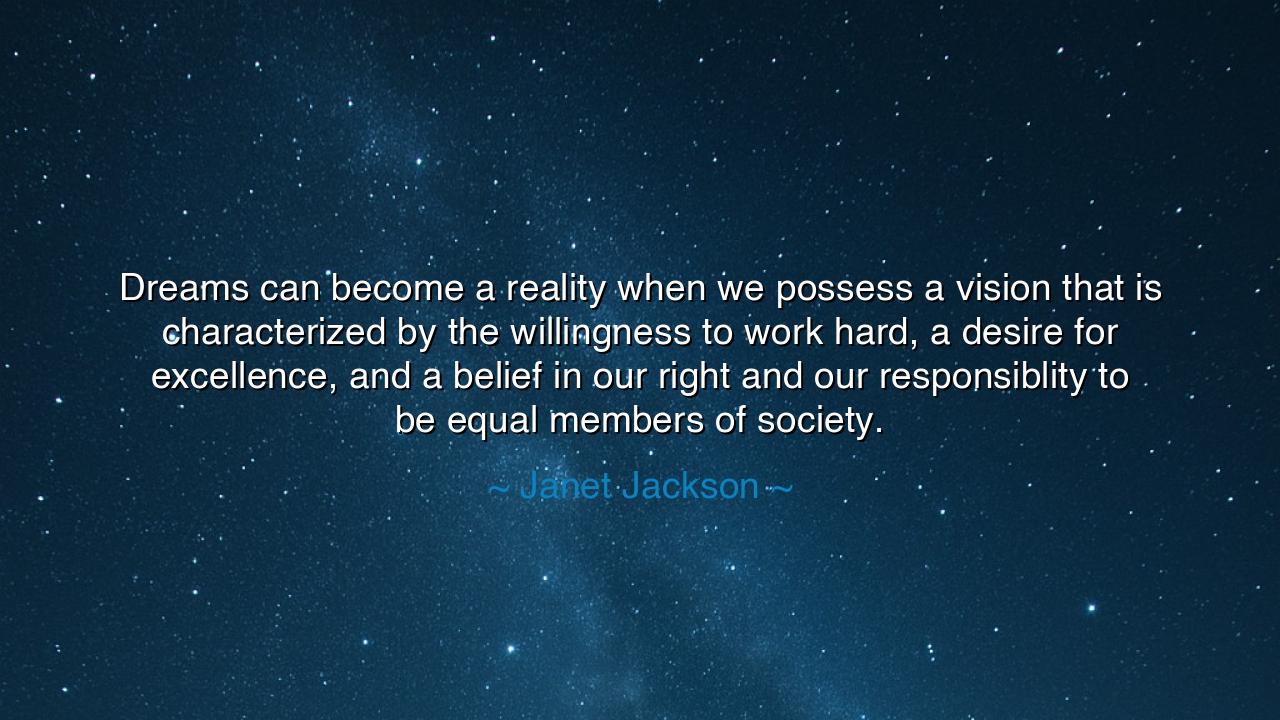
Dreams can become a reality when we possess a vision that is
Dreams can become a reality when we possess a vision that is characterized by the willingness to work hard, a desire for excellence, and a belief in our right and our responsiblity to be equal members of society.






“Dreams can become a reality when we possess a vision that is characterized by the willingness to work hard, a desire for excellence, and a belief in our right and our responsibility to be equal members of society.” Thus spoke Janet Jackson, the artist of both grace and strength, whose words reach far beyond the stage and into the realm of human aspiration. Her wisdom is not the fleeting spark of fame, but the enduring fire of discipline and conviction. In this truth lies a profound teaching: that dreams, though born in the heavens of imagination, take root only in the soil of effort, vision, and belief in equality—not just for oneself, but for all.
Jackson, who rose from humble beginnings in a family of extraordinary talent, knew well the cost of achievement. She did not speak as one who had her path laid before her, but as one who had to work, to fight, to earn her place in a world that often judges not by heart but by surface. Her words carry the rhythm of struggle and triumph. For she reminds us that it is not enough to dream vaguely or idly; one must dream with purpose, and that purpose must be guided by both excellence and justice. Dreams that rise only for the self are weak; but those that rise for the good of all humanity are unbreakable.
The first pillar she names is work—the sacred labor that turns vision into form. For no dream, however grand, becomes real through wish or whim. It is forged through discipline, persistence, and courage in the face of exhaustion. Every dancer’s grace, every scholar’s discovery, every hero’s act—each is born from unseen toil. As the ancients said, “The gods give to the striving.” Jackson’s words echo this eternal truth: that the dreamer must not simply imagine but endure. Without hard work, the vision withers; with it, even the smallest seed can grow into a tree that shelters generations.
The second pillar is the desire for excellence—not perfection, but mastery of the self and one’s craft. The true dreamer seeks not applause but the satisfaction of giving their utmost. Excellence is a kind of reverence, an offering of one’s best to the world. It means to live with integrity, to refine one’s gifts until they shine with purpose. Jackson herself, known for her precision and artistry, embodied this creed. She did not rest upon her name but carved her own legacy through dedication. Thus she teaches that excellence is not a privilege—it is a discipline of the spirit, a commitment to the divine possibility within us all.
The third and final pillar she offers is belief—the conviction that we have both the right and the responsibility to be equal members of society. Here lies the heart of her message, and its power. To believe in equality is not merely to claim it for oneself, but to uphold it for all. The dream is not complete until it uplifts the many, not just the few. History shows this truth again and again: from the dream of Nelson Mandela, who endured decades of imprisonment for the vision of a free South Africa, to the dream of Rosa Parks, who, with quiet strength, refused to move to the back of the bus. Both worked, both believed in excellence of spirit, and both claimed the sacred right of equality. And through their courage, the dreams of countless others were awakened.
In Janet Jackson’s words, there is both warning and promise. The warning: that dreams without work are illusions, and ambition without conscience is hollow. The promise: that when we unite vision, discipline, and belief in equality, there is nothing that cannot be transformed. Each human being carries within them the spark of divine creation, but it is only through effort and compassion that this spark becomes flame. When the dreamer remembers their duty not just to succeed but to serve, their dream becomes part of something eternal.
So, my child of hope and will, take this teaching into your heart: Dream, but also act. Work until the vision takes form. Pursue excellence, not vanity. Believe in yourself, but also in the dignity of every soul. Do not let the world’s injustice make you small; let it make you strong. Let your labor and your kindness become your song, and let that song lift others to their own dreams. For in this, you fulfill the purpose of life itself—to build a world where each person may rise, not alone, but together, in the light of equality and love.
And when you grow weary, remember Janet Jackson’s words—not as a whisper of comfort, but as a call to greatness. Dreams become reality not by chance, but by choice—by the courage to work, the pursuit of excellence, and the belief that we all belong to one great human family. Let your dream, then, be both personal and universal, for the dream that uplifts all mankind is the one that never dies.






AAdministratorAdministrator
Welcome, honored guests. Please leave a comment, we will respond soon